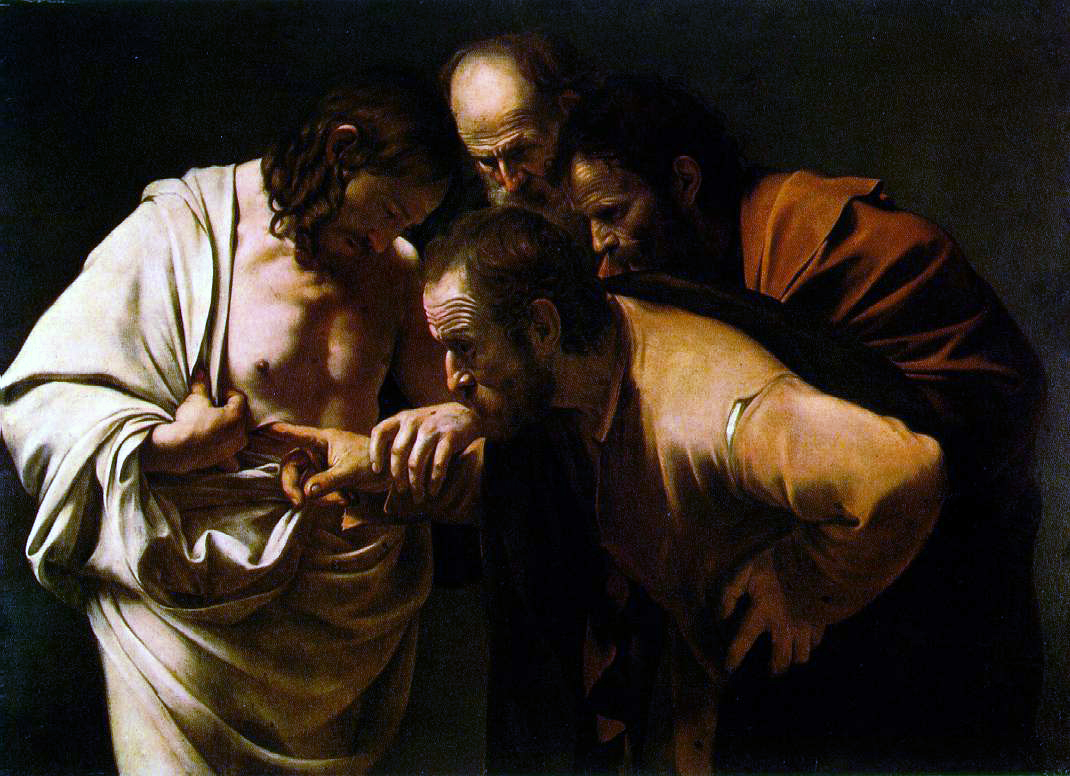Jesus said to him [Thomas], “Have you believed because you have seen me? Blessed are those who have not seen and yet have come to believe.”
–John 20:29
I was sitting in an adult forum class on a recent Sunday when the topics of fear, doubt, and belief were the topic of discussion. It was a good conversation, an honest conversation, facilitated by two teachers who were unafraid to admit their experience of doubt even in the presence of strong belief and a lifelong faith in God. Other people in the room spoke about their experiences; a young woman mentioning how disconcerting it was to doubt the teaching imparted by parents and to learn that life doesn’t always work out as planned. Another woman noted how easy it was to shut down dialogue when we deny the presence of doubt and disbelief. One man admitted how challenging it was to speak with non-believers, especially when confronted with new ways of looking at the story of Jesus.
The class discussion reminded me of the debate between Bishop John Shelby Spong and Professor William Lane Craig on Palm Sunday in 2005. The topic was the resurrection; the question was whether there was a true bodily resurrection of Jesus after his crucifixion. Both Spong and Craig presented creditable arguments for their perspective–Spong proposing that the bodily resurrection is somewhat suspect and Craig presenting a case for its reality. Who won? I’m not sure there were any “winners” in this debate, but I do think Christianity loses much whenever we who claim Christ are afraid to live in the tension of those details concerning our faith that remain in painted in broad strokes of varying shades of gray.
We like clear lines; we want black and white answers. Such definition makes our lives seem more manageable and gives us at least some illusion of control. If we can somehow mold God in our image of how the Divine One should be and behave, we can be comfortable. Remember how the Israelites begged Aaron for a “god” to worship while Moses was on the mountain and their insecurities and fears took over? Well, they didn’t exactly get what they’d bargained for, did they? The god of their own construction ended up leaving a rather bitter taste in their mouths.
There is plenty of fear and doubt to be had in the gospel text appointed for this week (John 20:19-21). Jesus’ disciples were huddled behind locked doors, fearing the fallout of their beloved leader’s “failed” mission, most likely feeling some abandonment and confusion over what step to take next. Suddenly Jesus is among them, reassuring them and offering them peace. He breathes on them, giving them the gift of the Holy Spirit and telling them “As the Father has sent me, so I send you.” Jesus meets them where they are and gives them just what they need to go on.
Of course, there was one who needed a little something different to move forward. Thomas, who had not been with the other disciples, needs not only to see the Lord but also to touch his wounds. Jesus provides exactly what Thomas needs, inviting him to put his hand in his side and to believe rather than doubt. For me, however, it’s the next verse (John 20:29) that’s so important in dealing with the hard questions of fear, doubt, and belief. In responding to Thomas’ needs, Jesus anticipates our needs, saying “Blessed are those who have not seen and yet have come to believe.”
I hear my Lord saying that it is okay not to have all the answers; it’s fine that I don’t know every minute detail of how things went down in those days following the crucifixion. It’s how I can listen to both Spong and Craig without feeling a need to claim one side above the other. I will admit that as an English teacher I’m already predisposed to living with metaphor and symbol. Instead of seeing these literary conventions as threats or hindrances to truth, I find them invaluable resources that enhance my experience and better equip me to deal with the uncomfortable truth of a God who will not be confined to any idolatrous notion I can conjure in my human brain. The God I serve will not be defined easily or comfortably in any rational terms. I AM is much bigger than that. Yet, like Thomas, I am able to confess “My Lord and my God!”
Can I provide all of the answers to your questions about the nature of God and the truth about Jesus’ bodily resurrection beyond all shadow of a doubt? Certainly not! Can I put your fears to rest when it comes to sharing the details of your faith or explain adequately how I can live in the tension between doubt and belief? Hardly! Can I profess Jesus Christ as my Lord and Savior without hesitation and qualification? Absolutely, yes! Jesus Christ is Lord, son of the living God, risen from the dead to conquer death once and for all. On this statement I’ll both hang my hat and bet the farm without so much as batting an eye.
May you believe without seeing and know the grace and peace of Jesus’ blessing in your life, and may God grant you courage to live in the tension and words, hands, and feet to walk as a disciple in this world. Amen.




Leave a Reply